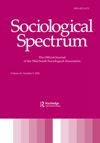与90后移民打算留在以色列有关的因素
IF 1.1
3区 社会学
Q2 SOCIOLOGY
引用次数: 0
摘要
摘要本研究考察了影响移民留在东道国意愿的因素。这些数据来自于在以色列进行的移民调查(N = 3611),并使用逻辑回归模型进行分析。结果表明,劳动力市场占有率、对经济状况的满意度、属于1.5代、移民年限、在以色列的宾至如归感、生活满意度、理想主义拉动因素导致的移民以及跨国关系的维持与移民留在东道国的意愿有关。按群体(埃塞俄比亚、前苏联和欧美)进行的分析显示,在这三个群体中,1.5代移民比第一代移民更不愿意留在该国。尽管方向不同,但移民后的年数与所有三组的结果变量有关。其他显著相关的因素预测了任何一个或两个研究组中的研究现象。研究结果表明,与移民有关的现象不仅与整个移民人口有关,而且与其单独的群体有关,因此可以更好地理解。它们还意味着,在同化范式中进行的移民研究应该考察各种因素,这些因素与所研究的现象的关系可以使用各种理论框架来解释。本文章由计算机程序翻译,如有差异,请以英文原文为准。
Factors associated with the intention to stay in Israel among post-1990 immigrants
Abstract This study examined the factors shaping immigrants' intention to stay in the host country. The data were attained from the immigrant survey conducted in Israel (N = 3,611) and analyzed using logistic regression models. The results show that labor market occupation, satisfaction with financial condition, belonging to 1.5 generation, number of years since migration, feeling at home in Israel, life satisfaction, immigration due to idealistic pull factors, and transnational ties maintenance relate to immigrants’ intention to stay in the host country. Analysis by groups (Ethiopia, Former USSR, and Europe-America) revealed that 1.5-generation immigrants were less likely to intend to stay in the country than first-generation immigrants in all three groups. Albeit in different directions, the number of years since migration related to the outcome variable in all three groups. Other significantly associated factors predicted the studied phenomenon in any one or two studied groups. The results imply that immigration-related phenomena are better understood when relating not only to the entire immigrant population but also to its separate groups. They also imply that the migration research conducted in the assimilation paradigm should examine the factors the relation of which to the studied phenomena may be explained using various theoretical frameworks.
求助全文
通过发布文献求助,成功后即可免费获取论文全文。
去求助
来源期刊

Sociological Spectrum
SOCIOLOGY-
CiteScore
3.80
自引率
5.60%
发文量
16
期刊介绍:
Sociological Spectrum publishes papers on theoretical, methodological, quantitative and qualitative research, and applied research in areas of sociology, social psychology, anthropology, and political science.
 求助内容:
求助内容: 应助结果提醒方式:
应助结果提醒方式:


